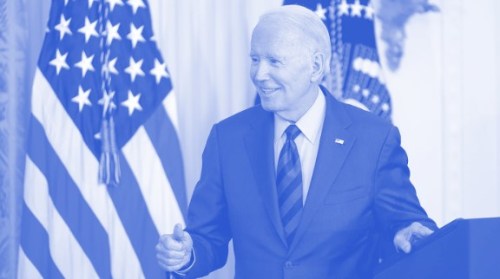2024 could be the last ‘battleground-state’ presidential election
Every four years, Americans think they are voting in a national presidential election. But pragmatically speaking, the vast majority are sideline voters, watching a battleground-state presidential election from the fringes.
This opinion is quantified by 2020 campaign data indicating that the Trump/Pence and Biden/Harris tickets spent $883 million of television ads across just six states and held in-person campaign events in only 12 states — mostly in the same six. This revealing data is antithetical to a nation that prides itself on conducting free and fair country-wide presidential elections.
How fair is our indirect presidential voting system that practically ignores voters in 38 of 50 states? The culprit is the constitutionally mandated Electoral College — an antiquated system by which electors from each state vote for the winner of their state’s popular vote. On those occasions when a candidate wins the 270 Electoral College votes needed to be elected president but loses the popular vote, a majority of voters feel cheated.
For all those reasons, the people want change.
According to a 2022 Pew Research study, 63 percent of adults support “changing the current system so the presidential candidate who receives the most votes wins.” Finding 63 percent of Americans to agree on anything in our hyper-polarized political environment is rare enough that this demonstrates significant distrust and disgust with the battleground-state presidential election.
Pew Research found that among Democrats, 80 percent support direct presidential voting, whereas only 18 percent oppose it. On the Republican side, 42 percent prefer the change, while 56 percent want to keep the Electoral College.
Among age groups, 70 percent of 18 to 29-year-olds prefer direct voting. Amazingly, all ages favor the change, even 56 percent of seniors over 65.
From a positive political perspective, a national popular vote would mean a presidential election free from the over-sized importance of Pennsylvania’s suburban swing voters — or swing voters anywhere — since everyone would equally become a swing voter.
Just imagine the first presidential election without battleground states. Every presidential candidate would be battling for your vote, no matter where you live. Suddenly, the national playing field would expand, fostering increased voter turnout and candidate visits to more than 12 states. At the same time, blue-state voters in red states and red-state voters in blue states wouldn’t feel that their presidential ballots are wasted.
Since nearly two-thirds of the people support electing the popular vote winner, how does change happen?
One option is through a constitutional amendment. Amendment ratification is an arduous process, such that the 27th Amendment, originally proposed in the 18th Century, was the last to be ratified in 1992. Proposed amendments require a two-thirds vote in the House of Representatives and Senate, followed by ratification by three-fourths of the states, or 38 of 50 (the same number of states ignored by the candidates in 2020).
In January 2021, Rep. Steve Cohen (D-Tenn.) introduced H.J.Res.14, proposing an amendment to abolish the Electoral College and replace it with direct presidential elections. It went nowhere.
The second option is the National Popular Vote Interstate Compact, which currently includes 15 states and the District of Columbia. It represents a viable hybrid plan that does not abolish the Electoral College (so no constitutional amendment) but forces the election of the national popular vote winner by changing how state legislatures award electors.
When a state joins the National Popular Vote (NPV) compact, it agrees to award its electoral votes to whichever candidate wins the national popular vote — even if its resident voters backed the other candidate. The compact becomes operational when enacted by member states whose electoral votes total 270.
Is it legal for states to change how they award presidential electors? Yes. Currently, Nebraska and Maine award some electors to the presidential candidate who wins an individual congressional district, not in the winner-take-all manner of most states. This suggests that alternative arrangements, such as that of the National Popular Vote compact, are constitutionally legitimate.
In April, Minnesota’s legislature voted to join the National Popular Vote compact. Upon the governor’s signature, Minnesota’s 10 electoral votes will bring NVP’s compact to 205 electoral votes — only 65 short of the 270 votes required for the enactment of the national popular vote.
Since 63 percent of Americans favor direct presidential voting, the NPV could be a suitable workaround, compared to the drawn-out process of a constitutional amendment. Moreover, proponents of the compact believe that by the 2028 election, Americans will elect their president by direct popular vote, ending the egregious farce of the battleground-state presidential election.
Furthermore, the previously mentioned 2020 campaign data is evidence that our Electoral College system is broken, warped, excludes American voters, is widely unpopular and must change.
As of October 2020, the Trump and Biden campaigns had spent an incredible $257.5 million just in Florida. Pennsylvania was second with $195.7 million, followed by Michigan’s $120 million. Rounding out the top six were North Carolina ($110.8 million), Wisconsin ($101.5 million) and Arizona ($97.4 million).
Interestingly, 2020 television campaign spending in Georgia ranked seventh at only $28.6 million. But then the Peach State unexpectedly flipped from red state to light blue. Thus, heading into 2024, Georgia will experience a major political and economic boost with its new decisive role. Expect the state’s television campaign ad spending to increase and presidential campaign visits to multiply in 2024, from only seven in 2020 to something closer to Pennsylvania’s 47.
In 2024, most safe red and blue states will again be ignored — a fatal flaw in our imbalanced, outdated system of electing a president that mocks our democracy and our sensibilities.
Hopefully, 2024 will be the last battleground-state election, in which we repeatedly hear how college-educated women voters in Atlanta’s suburbs will help determine the next leader of the free world.
Myra Adams, who served on the creative team of two Republican presidential campaigns in 2004 and 2008, writes about politics and religion. Follow her on Twitter @MyraKAdams.
Copyright 2023 Nexstar Media Inc. All rights reserved. This material may not be published, broadcast, rewritten, or redistributed.






